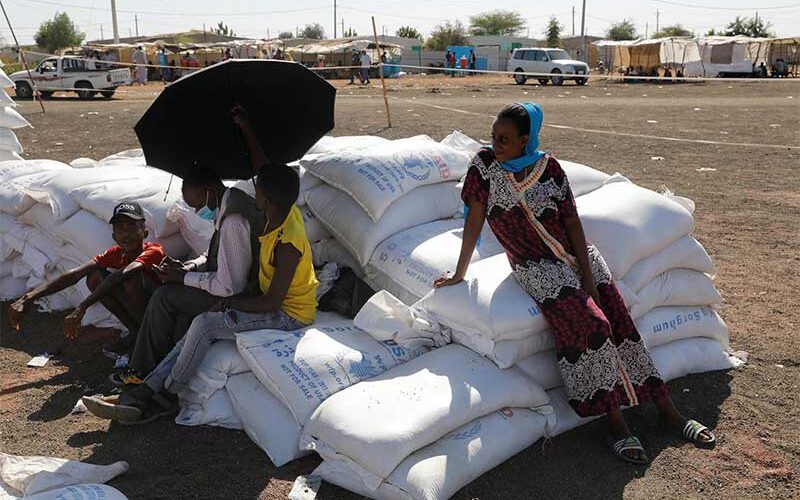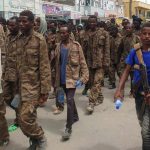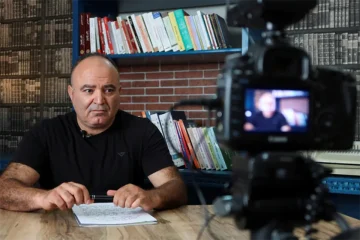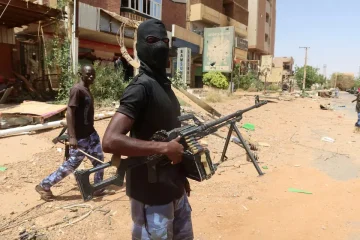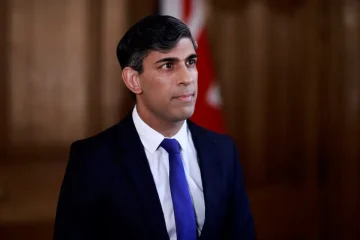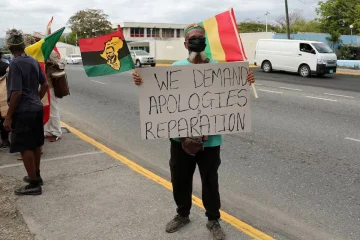RELIEF agencies in Ethiopia have prepared convoys to truck aid into the Tigray region, where clashes were still reported in a month of war that may have killed thousands and has sent refugees fleeing to Sudan along corpse-strewn roads.
Prime Minister Abiy Ahmed declared victory over the Tigray People’s Liberation Front (TPLF) after federal forces captured the regional capital Mekelle at the weekend.
However, TPLF leaders have dug into surrounding mountains in what appears to be an emerging guerrilla strategy.
One aid worker in touch with Tigray told Reuters that fighting continued to the north, south and west of the highland city of 500,000 people.
Diplomats following the crisis and in touch with sources on all sides say thousands of combatants and civilians appear to have died since Abiy’s offensive began on Nov. 4 after a TPLF attack on a military base was the last straw in their feud.
More than 45,000 refugees have crossed into neighbouring Sudan, while many more have been displaced within Tigray.
One refugee, who gave his name only as Abraham, said he fled heavy fighting in the Tigrayan town of Humera and saw corpses in civilian clothes as he walked towards the border with Sudan. “Nobody can bury them, they were outside on the road,” he recounted from Hamdayet, a Sudanese border transit point.
WAR CHILD
Ethiopia’s government and the TPLF have both accused each other of targeting civilians – and both denied that.
Reuters has been unable to verify claims from all sides as access to the northern Tigray region has been largely blocked and communications mainly down, although internet and phone services were returning to some towns this week.
In Qadarif, also in Sudan, the mother of a newborn baby recounted how she had fled Tigray even though she was more than eight months pregnant.
“While I was frightened and running away, that’s when the pain started, right in the middle of the street,” said Atikilti Salem, breast-feeding her 22-day-old baby Abeyam.
“I found a small village and gave birth in the hospital … I wanted to call her Africa, but I instead named her after the doctor who delivered her … When the war is over and we can go back home, I’m going to tell her the story of how she was born.”
After a clamour from aid agencies, Abiy’s government and the United Nations agreed to allow humanitarian aid into areas of Tigray controlled by federal forces. Some 600,000 people relied on food handouts even before the fighting.
Food stocks are nearly empty for 96,000 Eritrean refugees in Tigray, aid agencies say, while medics in Mekelle are short of painkillers, gloves and bodybags.
“Aid is needed now as there’s an acute shortage of food, medicine and other relief,” tweeted Norwegian Refugee Council head Jan Egeland, saying relief convoys were ready to go.
Tigray’s new government-appointed leader Mulu Nega said help was on its way to areas of west Tigray including Humera.
‘GOD KNOWS WHAT FUTURE WILL HOLD’
First video from Mekelle since its capture on Saturday, from state-run ETV, showed people shopping and sitting on stools.
“Life is getting back to normal … Everything is, as you can see, very peaceful,” one man said in the footage which Reuters could not independently verify.
Tigrayans have in the past strongly supported the TPLF and seen them as war heroes from the 1991 overthrow of a Marxist dictatorship.
Analysts fear that Abiy’s much-vaunted political opening, after he took office in 2018, could be set back by the Tigray conflict and his tougher line against foes including some jailings of opposition figures earlier this year.
He became prime minister after nearly three decades of TPLF-led government that had become increasingly repressive.
Abiy, who comes from the larger Oromo and Amharic ethnic groups, reduced Tigrayans from government and security posts, saying they were over-represented for a group making up 6% of the population.
The TPLF accuses their ex-military comrade and government coalition partner of trying to increase his personal power over Ethiopia’s 10 regions. Abiy denies that, calling them criminals who mutinied against federal authority. – Thomson Reuters Foundation.

